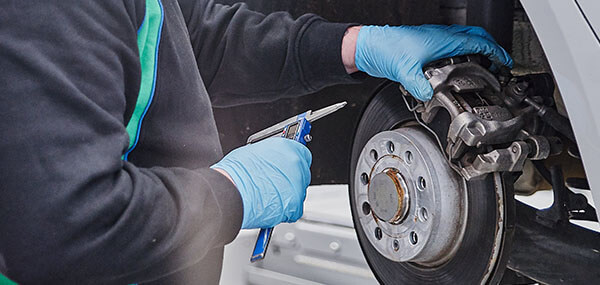FREE VISUAL BRAKE CHECK
Squeaky, grinding or unexpected noises when braking? Book a free visual brake check with ATS today. Our check offers a visual inspection of key parts of your braking system, and we’ll also check your brake fluid levels.

Squeaky, grinding or unexpected noises when braking? Book a free visual brake check with ATS today. Our check offers a visual inspection of key parts of your braking system, and we’ll also check your brake fluid levels.
Our Full Brake Inspection examines the condition of all of your brake components to keep you safe. This includes checking your car's brake pads, discs, callipers and more. Our brake test will also provide you with a report on the condition of your car's brakes and outline any additional work required.
Book your Brake Fluid Change online and help keep your brakes in optimum condition at all times.
Brakes wear out gradually. That’s why problems often go unnoticed until stopping distances increase or a dashboard warning light appears. Regular brake checks help catch issues early, before they affect your safety.
Brake pads and discs are designed to wear down over time. So are parts like the brake caliper and fluid system. If any of these components fail or become inefficient, your vehicle may not respond properly in an emergency.
Regular checks give you peace of mind that your brakes are working as they should. Our trained technicians can inspect your braking system and provide you with clear advice on what needs to be replaced — and what doesn’t.
A quick visual brake check at ATS Euromaster is free and only takes about 15 minutes. It’s one of the easiest ways to stay safe on the road and avoid expensive repairs later on.
Brake pads and discs don’t last forever. They wear down each time you brake, and once they become too thin or damaged, they need replacing to maintain safe stopping performance.
There’s no fixed schedule for when to change them — it depends on your driving habits, the type of roads you use and the condition of your braking system. However, there are clear signs to look out for:
Most brake pads last between 25,000 and 50,000 miles, but regular checks are key. If your vehicle mainly does stop-start journeys in town, your brakes may wear out faster.
At ATS Euromaster, our technicians can measure the exact thickness of your brake pads and inspect the condition of your discs. If they’re still within safe limits, we’ll let you know — no upselling, no pressure.
Need new pads or discs? We’ll replace them with parts that meet original equipment (OE) standards to ensure your braking stays sharp and responsive.
Brake fluid is a vital part of your braking system. It converts the pressure you apply on the pedal into stopping force. But over time, the fluid absorbs moisture, which reduces its effectiveness and can put your safety at risk.
As brake fluid degrades, you might notice that the pedal feels soft or less responsive. In severe cases, it can lead to overheating or reduced braking power, especially when driving in stop-start traffic or on long downhill stretches. Moisture in the system can also lead to corrosion, damaging internal components and increasing repair costs.
Most manufacturers advise replacing the fluid every two years or 20,000 miles. If it hasn’t been checked recently, a technician can test its quality and confirm whether a change is needed.
A proper fluid change involves draining the old fluid, flushing the system, and refilling it with the correct type for your vehicle. This process helps keep braking consistent, responsive and safe in all driving conditions.
Driving with worn brake pads puts your safety at risk. As the friction material wears away, braking becomes less effective and stopping distances increase. Continuing to drive can also damage the brake discs, leading to more expensive repairs. If you hear grinding or feel changes in braking, get them checked as soon as possible.
Front brake pads are larger and handle most of the braking force, especially during sudden stops. As a result, they wear out faster than rear pads. Rear brakes still play an important role in keeping the car stable and must be in good condition to ensure safe, balanced braking.
The caliper holds the brake pads and presses them against the discs when you brake. During a check, a technician looks for signs of sticking, corrosion or uneven wear. A faulty caliper can cause one wheel to brake more than the other, which affects control and increases wear on other parts.
Not always. Our full service and major service packages include it, but in many cases, brake fluid changes are separate. The need depends on the age and condition of the fluid. If the fluid has absorbed moisture or lost its effectiveness, a technician will recommend replacing it.
A soft brake pedal often points to air or moisture in the brake fluid, or possibly a leak in the system. This reduces braking pressure and makes the car less responsive. It’s a sign the system needs urgent inspection and possibly a fluid replacement or repair.
Yes. Common faults like worn pads, low brake fluid, unbalanced braking or warning lights can all lead to a failed MOT. Getting your brakes checked before the test reduces the risk of failure and helps you avoid unexpected costs.